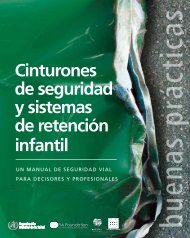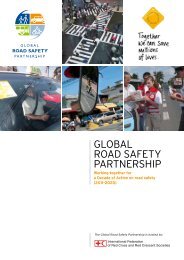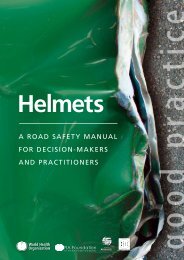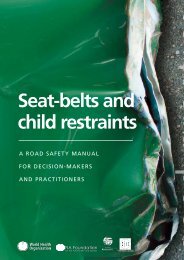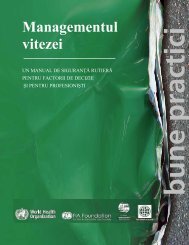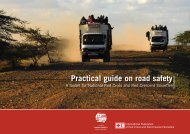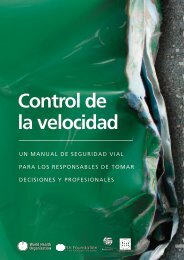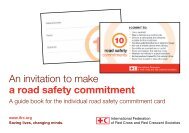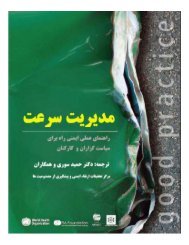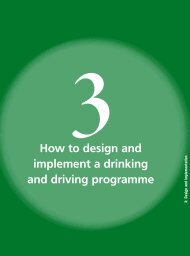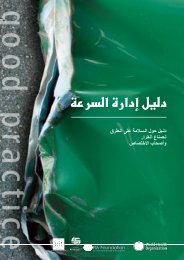Proactive Partnership Strategy - Global Road Safety Partnership
Proactive Partnership Strategy - Global Road Safety Partnership
Proactive Partnership Strategy - Global Road Safety Partnership
You also want an ePaper? Increase the reach of your titles
YUMPU automatically turns print PDFs into web optimized ePapers that Google loves.
Again using Brazil as the example, it is within the Micro culture where the<br />
greatest gains can be made in bringing about an advanced road safety<br />
culture in a community, but always taking a small step by step approach.<br />
In detail, two excellent examples of how this works in Brazil are as follows:<br />
1. Safe School Bus Drivers. School buses can be public or privately owned<br />
and are sometimes loosely regulated.<br />
A Safe School Bus Driver road safety system was made available, and<br />
attendance was voluntary. Over time, three levels of Municipal <strong>Road</strong> <strong>Safety</strong><br />
Quality Stamps (3 stars/Gold, 2 stars/Silver and 1 star/Bronze) are awarded<br />
to drivers after they attend a training session and commit to safer ways of<br />
operating. These stamps have a maximum 12 month validity period and<br />
are displayed on the front window or door of the bus.<br />
Soon parents and schools were demanding that their children only ride in<br />
buses where the driver had participated in road safety systems and had<br />
earned a quality stamp.<br />
Activity<br />
What are some potential micro<br />
system interventions that would<br />
hasten the growth in a road safety<br />
culture in your community Which<br />
sub-populations could be targeted<br />
for systems that would catapult an<br />
increase in the road safety culture<br />
What types of ‘awards’ would be most<br />
appealing to the targeted groups<br />
(Stamps, certificates, badges etc.)<br />
How could these systems be<br />
regulated and monitored in your<br />
community What needs to be put<br />
in place to maintain the integrity of<br />
the awards<br />
Drivers were eager to participate in the systems and to have the stamps,<br />
as it was good for business and there were good safety outcomes for all.<br />
2. Safe Taxi Drivers. Taxi drivers in some Towns were unreliable and unsafe,<br />
so as part of the PPS micro culture actions a road safety system (including<br />
the issue of drink driving) was offered to the taxi industry. Again the three<br />
tiered Quality Stamps were awarded, and these were displayed on the<br />
front window of the taxi.<br />
Progressively the paying passengers became aware of the meaning and<br />
value of the quality stamp and demanded that their taxi driver was a<br />
recognized safe driver. The demand for the safe taxi system increased,<br />
bringing benefits for all. Not only was the paying passenger safer, but the<br />
taxi driver was financially rewarded because more people wanted to use<br />
their services. The taxi industry overall found business was growing as the<br />
public gained confidence in it in terms of reliability and safety.<br />
Such initiatives at the micro level really echo the principles of social marketing<br />
as set down by Cialdini and mentioned earlier in the Introduction.<br />
47 <strong>Proactive</strong> <strong>Partnership</strong> <strong>Strategy</strong>



